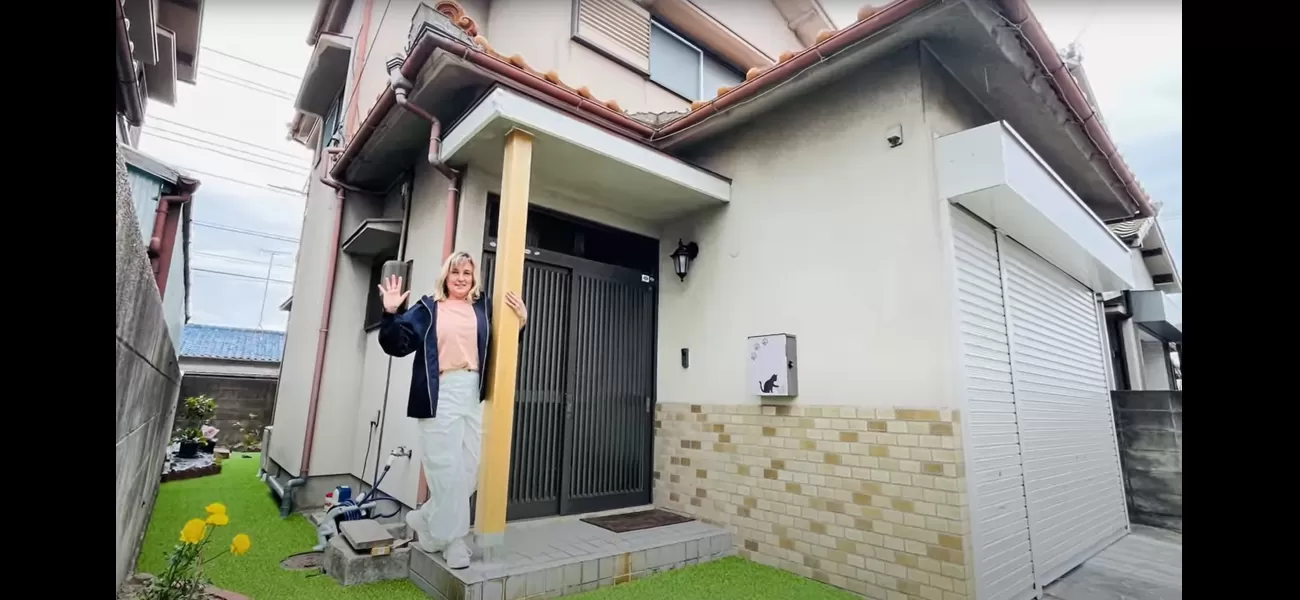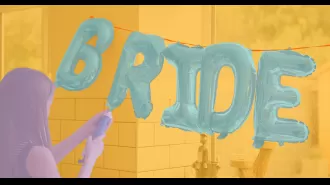Chani bought a rundown house in Japan to break out of her routine.
Chani used to be a busy Japanese teacher in Brisbane, but now her life has drastically changed.
May 2nd 2024.

Chani, a Japanese teacher at a high school in Brisbane, had been feeling stuck in her routine for a while. At 49 years old, she couldn't see a way to keep going. "I had hit a wall and started to feel the need for a major change," Chani, who preferred not to disclose her last name, shared with 9news.com.au.
After her children had grown and moved out, she finally had the freedom to take a leap of faith. Chani had always loved Japan and the idea of buying an abandoned home there had been on her mind for some time. Surprisingly, in a country like Australia where the housing market is notoriously competitive, Japan is facing a different issue - a growing number of empty homes. The latest government statistics show that there are approximately 11 million vacant properties, known as akiya, in Japan, accounting for 14% of all houses. This number is expected to reach 30% in the next ten years, according to the Nomura Research Institute.
Most of these abandoned homes are located in rural areas, as younger generations tend to prefer living in the city and leaving their inherited homes empty. For Chani, who had spent 18 months in the Japanese countryside as a teenage exchange student, the idea of owning a rural akiya was appealing. She began to do her research, following the real estate market in the Wakayama area, about an hour south of Osaka, where she wanted to buy.
"I was constantly checking real estate websites, trying to get a sense of the market and how quickly properties were selling," Chani said. She documented her journey of buying an akiya on her YouTube channel, Chani Japan. After securing a job teaching English and obtaining a working visa, Chani flew to Japan in April last year.
Buying a property in Japan can be a challenging process, especially for those who don't speak Japanese. According to Chani, most Japanese real estate agents prefer to do business in person and at a slower pace, making it difficult for non-Japanese speakers. "It took a while for me to build a relationship with the agent," Chani shared. "They don't usually conduct business over the phone or online. They want to meet you in person, get to know you, and make sure you're serious about buying the property."
Chani emphasized the importance of having someone who can speak Japanese when buying an akiya, as language barriers can make the process even more challenging. While some akiyas are being offered for free or at a very low cost in certain areas, Chani chose to avoid those properties due to potential issues they may come with. "The free ones are usually not in livable condition, and the cheap ones may have previous owners' belongings that are difficult to get rid of," Chani explained. "I decided to pay a bit more for a property that needed minor renovations, rather than dealing with major repairs."
Chani eventually settled on a two-story, 100 square-meter house built in the 1980s for $20,000. Although the house seemed to be in good condition, Chani encountered an unexpected problem soon after signing the contract. When the water was turned on, a leak was found in the pipes under the bathroom, and termite damage was discovered in the house. Despite the initial setbacks, Chani is now happily living in her Japanese countryside home, grateful for the opportunity to make a major change in her life.
Chani's life was becoming monotonous, as she spent long days teaching Japanese in a Brisbane high school. At 49 years old, she found herself feeling stuck and unsure of how to keep moving forward. "I hit a wall and knew I needed a big change," Chani shared with 9news.com.au, requesting to keep her last name private.
With her children now grown, Chani had the freedom to take a risk. She had been dreaming of moving to Japan, a country she adored, and purchasing an abandoned home for quite some time. Surprisingly, in a country like Australia where the housing market is fiercely competitive and prices are skyrocketing, Japan is facing the opposite issue. The population is dwindling, and as a result, there are millions of empty homes, known as akiyas, scattered throughout the country.
According to the most recent government data released this week, there are approximately 11 million akiyas in Japan, accounting for 14% of all houses. The Nomura Research Institute predicts this number will increase to 30% in the next ten years. Many of these abandoned homes are located in rural areas, as the younger generation prefers to leave inherited properties empty rather than move away from the city.
For Chani, who had lived in the Japanese countryside for 18 months during a teenage exchange program, the idea of owning a rural akiya was enticing. She began researching and familiarizing herself with the process. "I was constantly browsing real estate websites, keeping an eye on the areas I was interested in and monitoring house prices and how quickly they were being sold," Chani revealed.
Documenting her journey on her YouTube channel, Chani Japan, she was primarily looking at properties in the Wakayama area, about an hour south of Osaka. "I chose Wakayama because I can easily get to the airport within 40 minutes if I ever need to go home urgently, which I hope never happens," Chani explained. "Also, I'm in the countryside, but I'm just an hour train ride away from the second-largest city in Japan. I wanted to be close to the city and not feel too isolated."
After securing a job teaching English and obtaining a working visa, Chani flew to Japan in April of last year. However, buying a property in Japan can be a daunting task, especially if you do not speak Japanese. Chani admitted that most real estate agents in Japan do not speak English and prefer to do business in person at a slow pace. "It's not something they do over the phone or online," Chani shared. "They want to meet you in person and get to know you before they're willing to do business with you. They want to know if you're a serious buyer or just curious."
"It's not impossible to buy a property in Japan if you have someone who can speak Japanese, but you can't rely on the agent to speak English and assist you. It's just not how it works," she added.
While some akiyas are being given away for free or at a minimal cost in certain parts of Japan, Chani steered clear of those properties due to the potential issues they may come with. "The free ones are usually not livable, and you know there will be problems," Chani explained. "And the other cheaper ones may have someone's belongings inside, which can be challenging to get rid of. I knew that if I paid a bit more, it would be more cost-effective in the long run, as I wouldn't have to do any major renovations, just some minor cosmetic work."
Chani's akiya, which she purchased for $20,000, was a two-story house with a total of 100 square meters. Built in the 1980s, the house appeared to be in excellent condition, with only minor renovations needed to suit her needs. However, just after signing the contract, Chani faced an unexpected and unpleasant surprise. When the water was turned on, a leak was discovered in the pipes beneath the bathroom, and termite damage was also found in the house.
After her children had grown and moved out, she finally had the freedom to take a leap of faith. Chani had always loved Japan and the idea of buying an abandoned home there had been on her mind for some time. Surprisingly, in a country like Australia where the housing market is notoriously competitive, Japan is facing a different issue - a growing number of empty homes. The latest government statistics show that there are approximately 11 million vacant properties, known as akiya, in Japan, accounting for 14% of all houses. This number is expected to reach 30% in the next ten years, according to the Nomura Research Institute.
Most of these abandoned homes are located in rural areas, as younger generations tend to prefer living in the city and leaving their inherited homes empty. For Chani, who had spent 18 months in the Japanese countryside as a teenage exchange student, the idea of owning a rural akiya was appealing. She began to do her research, following the real estate market in the Wakayama area, about an hour south of Osaka, where she wanted to buy.
"I was constantly checking real estate websites, trying to get a sense of the market and how quickly properties were selling," Chani said. She documented her journey of buying an akiya on her YouTube channel, Chani Japan. After securing a job teaching English and obtaining a working visa, Chani flew to Japan in April last year.
Buying a property in Japan can be a challenging process, especially for those who don't speak Japanese. According to Chani, most Japanese real estate agents prefer to do business in person and at a slower pace, making it difficult for non-Japanese speakers. "It took a while for me to build a relationship with the agent," Chani shared. "They don't usually conduct business over the phone or online. They want to meet you in person, get to know you, and make sure you're serious about buying the property."
Chani emphasized the importance of having someone who can speak Japanese when buying an akiya, as language barriers can make the process even more challenging. While some akiyas are being offered for free or at a very low cost in certain areas, Chani chose to avoid those properties due to potential issues they may come with. "The free ones are usually not in livable condition, and the cheap ones may have previous owners' belongings that are difficult to get rid of," Chani explained. "I decided to pay a bit more for a property that needed minor renovations, rather than dealing with major repairs."
Chani eventually settled on a two-story, 100 square-meter house built in the 1980s for $20,000. Although the house seemed to be in good condition, Chani encountered an unexpected problem soon after signing the contract. When the water was turned on, a leak was found in the pipes under the bathroom, and termite damage was discovered in the house. Despite the initial setbacks, Chani is now happily living in her Japanese countryside home, grateful for the opportunity to make a major change in her life.
Chani's life was becoming monotonous, as she spent long days teaching Japanese in a Brisbane high school. At 49 years old, she found herself feeling stuck and unsure of how to keep moving forward. "I hit a wall and knew I needed a big change," Chani shared with 9news.com.au, requesting to keep her last name private.
With her children now grown, Chani had the freedom to take a risk. She had been dreaming of moving to Japan, a country she adored, and purchasing an abandoned home for quite some time. Surprisingly, in a country like Australia where the housing market is fiercely competitive and prices are skyrocketing, Japan is facing the opposite issue. The population is dwindling, and as a result, there are millions of empty homes, known as akiyas, scattered throughout the country.
According to the most recent government data released this week, there are approximately 11 million akiyas in Japan, accounting for 14% of all houses. The Nomura Research Institute predicts this number will increase to 30% in the next ten years. Many of these abandoned homes are located in rural areas, as the younger generation prefers to leave inherited properties empty rather than move away from the city.
For Chani, who had lived in the Japanese countryside for 18 months during a teenage exchange program, the idea of owning a rural akiya was enticing. She began researching and familiarizing herself with the process. "I was constantly browsing real estate websites, keeping an eye on the areas I was interested in and monitoring house prices and how quickly they were being sold," Chani revealed.
Documenting her journey on her YouTube channel, Chani Japan, she was primarily looking at properties in the Wakayama area, about an hour south of Osaka. "I chose Wakayama because I can easily get to the airport within 40 minutes if I ever need to go home urgently, which I hope never happens," Chani explained. "Also, I'm in the countryside, but I'm just an hour train ride away from the second-largest city in Japan. I wanted to be close to the city and not feel too isolated."
After securing a job teaching English and obtaining a working visa, Chani flew to Japan in April of last year. However, buying a property in Japan can be a daunting task, especially if you do not speak Japanese. Chani admitted that most real estate agents in Japan do not speak English and prefer to do business in person at a slow pace. "It's not something they do over the phone or online," Chani shared. "They want to meet you in person and get to know you before they're willing to do business with you. They want to know if you're a serious buyer or just curious."
"It's not impossible to buy a property in Japan if you have someone who can speak Japanese, but you can't rely on the agent to speak English and assist you. It's just not how it works," she added.
While some akiyas are being given away for free or at a minimal cost in certain parts of Japan, Chani steered clear of those properties due to the potential issues they may come with. "The free ones are usually not livable, and you know there will be problems," Chani explained. "And the other cheaper ones may have someone's belongings inside, which can be challenging to get rid of. I knew that if I paid a bit more, it would be more cost-effective in the long run, as I wouldn't have to do any major renovations, just some minor cosmetic work."
Chani's akiya, which she purchased for $20,000, was a two-story house with a total of 100 square meters. Built in the 1980s, the house appeared to be in excellent condition, with only minor renovations needed to suit her needs. However, just after signing the contract, Chani faced an unexpected and unpleasant surprise. When the water was turned on, a leak was discovered in the pipes beneath the bathroom, and termite damage was also found in the house.
[This article has been trending online recently and has been generated with AI. Your feed is customized.]
[Generative AI is experimental.]
0
0
Submit Comment





